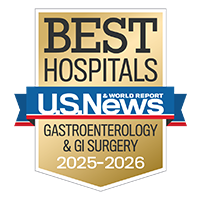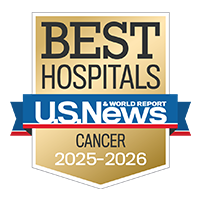Gastrointestinal stromal tumors

Overview
What is a gastrointestinal stromal tumor (GIST)?
A gastrointestinal stromal tumor (GIST) is a rare type of cancer in which abnormal cells form in the gastrointestinal or GI tract. The GI tract is the digestive passageway between the mouth and the anus, which includes the organs responsible for breaking down food and absorbing nutrients. GISTs can develop anywhere in the digestive system but occur most often in the stomach and small intestine. While some GISTs grow slowly and don't cause issues, others grow and spread rapidly.
Our approach to GISTs
UCSF's highly trained and experienced GI oncologists and surgeons offer advanced, effective care for gastrointestinal stromal tumors. They provide each patient with a precise diagnosis and a personalized treatment plan, which may include surgery, medications or both. Interested patients also may have opportunities to participate in clinical trials of promising treatments for gastrointestinal stromal tumors (GISTs). Learn more about the process and potential benefits of participating in a clinical trial.
In addition, we offer continued care for patients who have completed treatment for gastrointestinal cancers. The goals of our Cancer Survivorship and Wellness Institute include minimizing the risk of cancer recurrence and maximizing quality of life.
U.S. News rankings
-

Among the top hospitals in the nation
-

Best in Northern California for gastroenterology & GI surgery
-

Best in California and No. 7 in the nation for cancer care
Causes of GISTs
In adults, most gastrointestinal stromal tumors are caused by changes in either the KIT gene or the PDGFRA gene. As a result of the mutation, tumor cells develop in the digestive tract lining and start to grow and divide uncontrollably.
In children, GISTs are usually caused by a different gene mutation.
In most cases, these gene mutations occur randomly, but there are rare cases in which the mutation is inherited, usually as the result of another inherited tumor disorder, such as neurofibromatosis type 1 (NF1) or Carney-Stratakis syndrome.
Symptoms of GISTs
Symptoms of gastrointestinal stromal tumors can resemble those of other conditions, so a thorough medical evaluation is important to ensuring an accurate diagnosis. Signs of a GIST may include:
- Abdominal pain
- Blood in stool or vomit
- Difficulty swallowing
- Fatigue
- Feeling full more quickly than normal
Diagnosis of GISTs
Your doctor will ask about your symptoms and review your personal and family medical histories. They may perform a physical exam to feel for masses in your abdomen or other areas where GISTs develop.
Your doctor may order diagnostic tests, including:
- Computed tomography (CT) scan. This imaging technique uses X-rays to create images of your body's inner organs and tissues, helping doctors spot GISTs and learn their size and precise location.
- Magnetic resonance imaging (MRI) scan. Using powerful magnets and radio waves, this test produces detailed pictures of soft tissues that allow doctors to locate and evaluate tumors.
- Endoscopic ultrasound. Sound waves create images of your digestive tract and nearby tissues. This technique may be used to guide a tumor biopsy (see next item).
- Biopsy. A small sample of tissue is taken from the tumor and examined under a microscope to determine whether it’s a GIST or another type of abnormality.
Treatment of GISTs
The right initial treatment for a gastrointestinal stromal tumor depends on whether it can be surgically removed and whether it has spread within the body. Later on, treatment options may be different if the cancer doesn’t respond to treatment or responds but then comes back.
Very small GISTs (smaller than the eraser on a pencil tip) sometimes remain as they are – neither growing larger nor spreading. In these cases, doctors may recommend a watch-and-wait approach, where the tumor is checked regularly for signs of growth.
Larger or more worrisome GISTs are treated with surgery, targeted therapy or both.
Surgery for GISTs
Surgery is the best treatment for a GIST that hasn’t spread to other areas of the body and can be safely removed. In some cases, the surgeon can use minimally invasive techniques to access the tumor through several small incisions rather than one large one. The outcomes are the same as for the traditional surgery, but there's a lower risk of complications and patients experience less post-op pain and recover more quickly.
Targeted therapy for GISTs
Targeted therapy is a way to attack cancer cells while minimizing harm to normal cells. Targeted therapy drugs called tyrosine kinase inhibitors (TKIs) are used to treat GISTs. TKIs are taken by mouth in pill form.
TKIs may be used if:
- The tumor can’t be safely removed with surgery or only part of it can be removed.
- The cancer has spread from the initial site.
- The cancer has come back after treatment.
- The risk of recurrence is high.
UCSF Health medical specialists have reviewed this information. It is for educational purposes only and is not intended to replace the advice of your doctor or other health care provider. We encourage you to discuss any questions or concerns you may have with your provider.
Where to get care (2)
Related clinics (4)

Osher Center for Integrative Health
 2
2
















